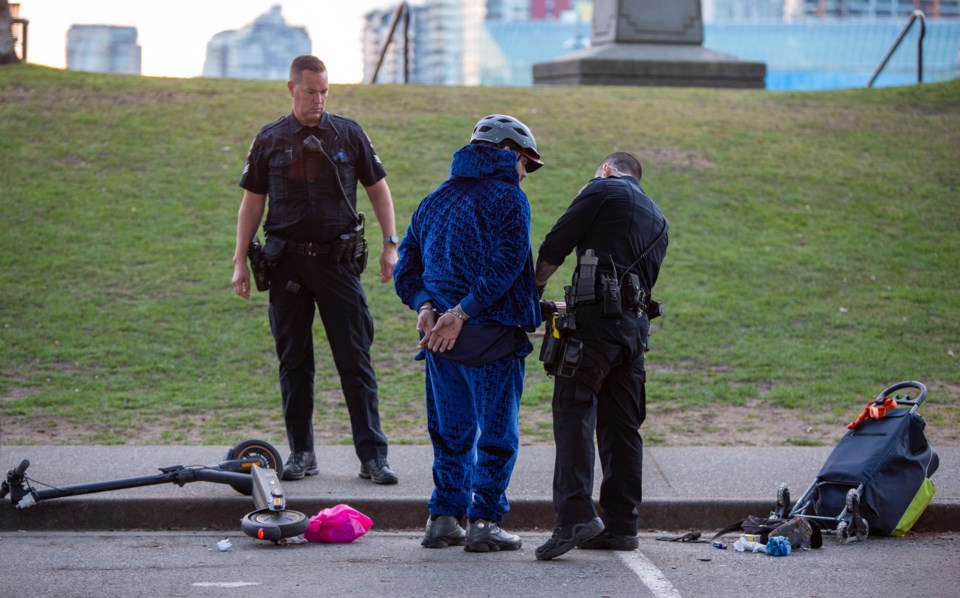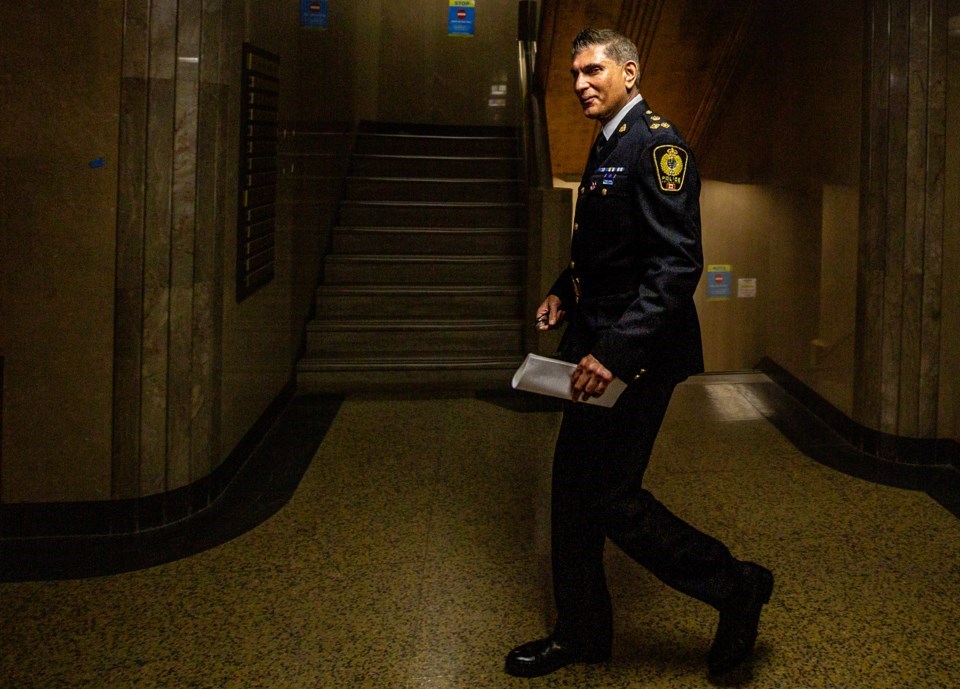Steve Rai, the Vancouver Police Department’s new chief, began his journey in Canada as a five-year-old immigrant from India. He’s now the first person of South Asian descent to lead the VPD.
In part one of BIV’s Q&A, he reflected on his historic appointment, his leadership philosophy and the tragic Lapu Lapu Day vehicle attack that tested him in his first hours as interim chief. In part two, Rai outlines the challenges ahead and how he plans to lead the department through complex social and political terrain.
What’s your vision for the department?
The ultimate vision is to be the best department in the world. You want to be the most innovative, the most inclusive, the most diverse and have the best culture internally. You want to have people who are happy, engaged employees. That's the vision, but it's a pathway to get there. We have a very young police department, and I want to make sure the young officers continue to understand what they're doing and what it's tied to—why they put on the uniform and what their purpose is.
I addressed patrol last night, and they were all in their 20s. So when you have that kind of change, one of the visions is to keep them connected to the wider good, the wider purpose. That can speak to innovation, opportunities, training, engagement internally, fairness and everything we do that impacts them.
How has the pandemic affected policing?
Whether it's policing, whether it's social media, whether it's politics — everything switched because of COVID. People's world views switched. I think it awakened something greater in people, and we’ve got to make sure we're matching it. So that means engaging not the middle group in society—which is always supportive—but the people who feel marginalized.
It could be from any marginalized community. It could be from racial, ethnic groups. It could be from groups around identity, sexual identity, anything. So we want to welcome people back in the tent, and that may mean some difficult conversations. After [the homicide of] George Floyd in the United States, political lines got drawn over whether police should have this much money or not. So we have to work with government.
I've never seen this much interaction with police from political leaders throughout the country, not just regionally, but provincially and federally. Policing has become so ingrained in social policy. Is it a good thing or bad thing? I don't know. But the vision is to have the best police department on a lot of different fronts, but there are some challenges to get there.
Crime continues to fall in Vancouver. What do you attribute that to?
From the street level perspective, we're present everywhere. When you fight crime, the simplest thing is presence. If you have a uniformed police officer visible in a neighbourhood, it helps push crime lower. Secondly, we're very good at putting out information and having the community, including community policing centres, engaged as ears and eyes. These are all basic principles of crime fighting.
We're fairly good at targeted enforcement, whether it's Project Barrage [in the Downtown Eastside] or whether it's going after people committing distraction thefts. But the city’s demographics and neighbourhoods are changing, too. Most of my career was in East Van, where there was gun violence every day—open warfare with guys with machine guns out the back of the windows of cars, shooting each other on Kingsway. Remember those days? Now you go there and it's not our busiest district anymore.
Back in the day, when I started, everyone wanted to work there because as a cop, you would learn more in one year than you would working anywhere else in the city in three or four years. So you could call it gentrification. You can call it economic prosperity, but the city's demographics have changed and people care about their neighbourhoods. When they look out the window and see something, they aren't afraid to call the police. We have done a good job in developing confidence in people wanting to pick up the phone and call.

At the same time, the department’s own data shows more than 22,000 calls to the VPD’s non-emergency line were abandoned by citizens in 2024. That’s a big drop from the 80,000 or 90,000 abandoned calls from a few years ago, but people are still giving up when trying to report a crime or concern.
I was just at E-Comm [which operates the VPD’s non-emergency line] with some other officers this week. From what I saw walking the floors there with their leadership team, they've done a really good job in recruiting, retaining staff and having people answer the phones to make sure the wait times aren't what they used to be.
Frankly, I would be the same as these people [who abandon calls] because I don't have an hour to sit on the phone. So that part of the system, from what I saw, has picked up. But that’s E-Comm. What can we do better? We're doing it through social media and through press conferences, through engagement and education. Disinformation is prevalent now everywhere. Getting that word out on not letting the narrative of ‘Hey, the cops don't care’ persist and instead show the wins is important.
So please call. We do take it seriously.
Even though the data shows crime is falling, there is still a big push from business operators for the police to stop the aggressive shoplifters, the attacks on staff and the broken windows. What’s the department doing about that?
I would hedge to bet most of these people breaking the windows have some issue going on that's not a policing issue. Yes, it's a crime and we're arresting them on the crime of ‘broken window.’ But they're entering the system on an addiction issue, a mental health issue, poverty issue, and then coming right back out [of custody]. So, yes, it's a crime but the solution there isn't the constant chasing our tail. There has to be intervention from other stakeholders, supported by government. We’ve got to break that cycle.
And what about aggressive shoplifters?
With aggressive shoplifters, that's a business—that's a criminal enterprise going on. I won't be as arrogant to say it’s all 100 per cent because there are people shoplifting for survival, they're poor and I recognize that. But when you've got co-ordinated shoplifting and co-ordinated selling of the merchandise somewhere in the neighbourhood, there's a criminal element to that.
We're running a project right now to go after this, we do public campaigns of education and awareness, have dedicated teams and we're working with the stores. If you want a city to thrive, businesses have to be able to survive. We're not trying to arrest people that are homeless—we're trying to target the criminals that are preying on those people.
Every year you hear critics say the VPD budget has to be curtailed, yet it continues to increase. A report to the police board in November 2023 suggested the budget will be close to half a billion dollars by 2028. Why does the department need so much money to operate?
You just have to look south of the border at the cost of not doing proper policing. Every city that cut money from police budgets saw their cities deteriorate.
Detroit's a prime example. It's taken them decades—a generation — to try to bring back the city the way it was. It was a prosperous city in the 50s and 60s, and then they defunded police and other services that are core. And then you had almost a deserted city. I've been there—it's horrible. New Orleans is another one. Go to any city where policing isn't well funded, and you'll see a city on the decline.
Your predecessors have used their position to publicly call for more investment from senior governments to address the crisis of drug addiction, mental illness and housing. Bail reform has been another request of previous chiefs. How much of your time as chief will be spent doing the same?
Forty per cent.
Really, that’s a lot of time.
Well, I’m doing it right now with you. Everywhere we go where there's community engagement, we get these questions. Our public affairs [team] continues to make sure we're getting messaging out. You're constantly adjusting resources and asking for more to respond to social issues. You're constantly lobbying with government. So every day, I'm doing that at least a couple hours a day.
There’s no other choice. We arrest people, put them in the system. They have a mental illness or addiction, or it’s a poverty-related, marginalized issue. Courts aren't going to say you deserve 10 years because you're poor. But then that person is back on the street trying to survive. We get a 911 call about a crime. We go and catch that person and put them back in the system, and on it goes.
So there's no option other than to advocate and put pressure on people that have control of our tax dollars.
X/@Howellings


